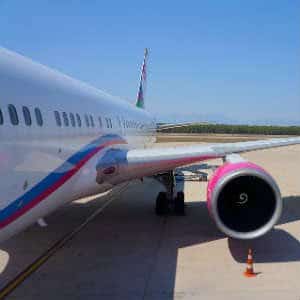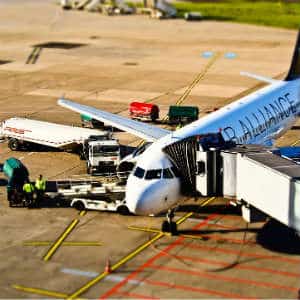Anyone who has ever been to an airport knows how busy these transportation hubs can be. Hundreds and thousands of flights take off and land each day thanks to the hard work of thousands of individuals who work around the clock to make sure the entire system runs as smoothly as possible. While it’s easy for tired and frustrated travelers to complain about delayed or canceled flights, it’s important to remember that many times the people that do make things go as planned are at risk and airline and airport workers are frequently injured.
Each Position Is At Risk
No two jobs come with the same risks and there are a wide variety of positions available both in the airport and aboard a plane.
Baggage Handlers

Ground Crews
Technicians, ramp agents, customer service agents, and flight dispatchers are all part of the ground crew. Constant loud noise, heavy machinery, weather exposure, and heavy objects may all cause a member of the ground crew bodily harm.
Pilots
While pilots may not be lifting heavy bags, there is always the chance that they could be involved in a plane crash or be harmed by something like a defective product, for example, defective extending stairs that are used to board a plane.
Flight Attendants
Flight attendants are more at risk than pilots because the nature of their job sends them walking around the cabin. Unexpected turbulence can cause them to fall or for loose objects to fly through the air, striking an attendant and breaking bones or causing head trauma. Attendants are also at risk for violent assault by a passenger.
Security Personnel
Security officers may be both in the airport and on the plane. Of course, they may find themselves dealing with an unruly passenger or sadly, by someone who is attempting to commit a violent act and become harmed in the process. Or, like anyone else, they could sustain a head or back injury because of a slip and fall accident.
Maintenance Crews
Airplanes, runways, ramps, and the inside of an airport always require regular maintenance to ensure that visitors and passengers are kept safe. Those who are tasked with performing this maintenance are expected to lift heavy loads, work with dangerous tools, and work outside in all sorts of weather.
Food Service Workers
Weary travelers are frequently looking for food and drink while waiting for their flights. Like any other restaurant, bar, or fast food place, food service workers may sustain burns from working with hot ovens and stoves, cut themselves with sharp implements, or slip and fall on a spilled liquid.
Each of these positions may also be at risk for developing a work-related illness, especially those who work regularly with certain types of fumes. But regardless of what type of injury or illness is sustained, all of these employees should have their medical bills covered under workers’ compensation.
Does Workers’ Compensation Cover All Medical Treatments?

Despite the fact that workers’ comp is “no fault” meaning that it doesn’t matter who caused the accident or exposure which required the worker to seek medical attention, getting the insurance company to pay for medical expenses isn’t always as easy as it should be. In fact, nearly half of all initial claims are denied outright by the insurance company.
Why Would A Claim Be Denied?
There are several common reasons why a claim may be denied:
- A mistake was made on the claim form.
- The medical records don’t indicate the injury or illness is job-related.
- The employer is contesting the claim.
- The claim wasn’t filed in a timely manner.
Whatever the reason, the fact is that research shows that an injured employee has a much better chance of obtaining the coverage they need by working with an experienced attorney who can guide them through the process of filing a claim.
What If An Employee Becomes Permanently Disabled?
If the employee sustained an injury which prevents them from returning to a job they previously enjoyed, such as a spinal injury or traumatic brain injury, the may qualify for Social Security Disability Insurance.
Even though most people associate social security with people who have reached retirement age, this program is also for those who have become disabled and are no longer able to work. In order to be eligible, a worker must:
- have worked 20 out of the past 40 quarters
- have sustained a physical or emotional disability that is severe enough to keep them from returning to work
- obtain a doctor’s report and other evidence to prove they are unable to go back to work
Even with the appropriate evidence, around 60% of all claims are denied and the appeals process can be arduous.
